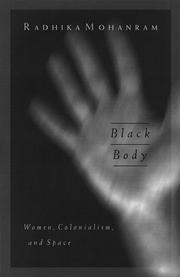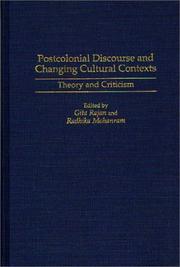| Listing 1 - 7 of 7 |
Sort by
|

ISBN: 0816635420 0816635439 Year: 1999 Publisher: Minneapolis, Minn. University of Minnesota Press
Abstract | Keywords | Export | Availability | Bookmark
 Loading...
Loading...Choose an application
- Reference Manager
- EndNote
- RefWorks (Direct export to RefWorks)

ISBN: 0313296936 Year: 1995 Volume: 64 Publisher: Westport, Conn. London Greenwood Press
Abstract | Keywords | Export | Availability | Bookmark
 Loading...
Loading...Choose an application
- Reference Manager
- EndNote
- RefWorks (Direct export to RefWorks)
Colonies dans la littérature --- Colonies in literature --- Decolonization in literature --- Dekolonisatie in de literatuur --- Décolonisation dans la littérature --- Imperialism in literature --- Imperialisme in de literatuur --- Impérialisme dans la littérature --- Koloniale literatuur --- Kolonies in de literatuur --- Littérature coloniale --- Littérature postcoloniale --- Postkoloniale literatuur --- Colonies in literature. --- Imperialism in literature. --- Literature and anthropology. --- Literature, Modern --- Postcolonialism in literature. --- Postcolonialism. --- History and criticism --- Theory, etc. --- Literature [Modern ] --- Developing countries --- Literature --- Developing countries - Literatures - History and criticism.
Book
ISBN: 9042012617 Year: 2000 Publisher: Amsterdam Rodopi
Abstract | Keywords | Export | Availability | Bookmark
 Loading...
Loading...Choose an application
- Reference Manager
- EndNote
- RefWorks (Direct export to RefWorks)
Book
ISBN: 178138097X 1781385637 9781781385630 9781846318962 1846318963 Year: 2013 Publisher: Liverpool
Abstract | Keywords | Export | Availability | Bookmark
 Loading...
Loading...Choose an application
- Reference Manager
- EndNote
- RefWorks (Direct export to RefWorks)
Within postcolonial studies, Britain's long contact with India has been read generally only within the context of imperialism to inform our understanding of race, gender, identity, and power within colonialism. Such postcolonial interpretations that focus on single dimensions of identity risk disregarding the sense of displacement, discontinuities, and discomforts that compromised everyday life for the British in India-the Anglo-Indians-during the Raj. Imperialism as Diaspora reconsiders the urgencies, governing principles, and modes of being of the Anglo-Indians by approaching Britain's imperial relationship with India from new, interdisciplinary directions. Moving freely between the disciplines of literature, history, and art this new work offers readers a more nuanced and comprehensive understanding of the lives of Anglo-Indians.Focussing on the years between the Indian Mutiny of 1857 and Independence in 1947-the period of the British Raj in India-Imperialism as Diaspora at once sets in motion the multidisciplinary fields of cultural and social history, art and iconography, and literary productions while carefully maintaining the tension between imperialism and diaspora in a ground-breaking reassessment of Anglo-India.Crane and Mohanram examine the seamless continuum between cultural history, the semiotics of art, and Anglo-Indian literary works. Specifically, they focus on the influence of the Sepoy Mutiny on Anglo-Indian identity; the trope of duty and the white man's burden on the racialization of Anglo-India; the role of the missionary and the status of Christianity in India; and gender, love and contamination within mixed marriages.
Anglo-Indian fiction --- English fiction --- English literature --- Indic fiction (English) --- History and criticism. --- Indic influences. --- India --- Bharat --- Bhārata --- Government of India --- Ḣindiston Respublikasi --- Inde --- Indië --- Indien --- Indii︠a︡ --- Indland --- Indo --- Republic of India --- Sāthāranarat ʻIndīa --- Yin-tu --- インド --- هند --- Индия --- History --- Historiography. --- Literature and the rebellion. --- In literature. --- Anglo-Indian literature --- British --- Imperialism in literature. --- Intellectual life. --- Social life and customs. --- British Occupation of India (1765-1947) --- 1765 - 1947

ISBN: 9042012714 Year: 2000 Publisher: Amsterdam Rodopi
Abstract | Keywords | Export | Availability | Bookmark
 Loading...
Loading...Choose an application
- Reference Manager
- EndNote
- RefWorks (Direct export to RefWorks)
Sociolinguistics --- Sociology of literature --- English literature --- Indo-European literature

ISBN: 9789004486676 9789042012714 Year: 2000 Publisher: Leiden; Boston : BRILL
Abstract | Keywords | Export | Availability | Bookmark
 Loading...
Loading...Choose an application
- Reference Manager
- EndNote
- RefWorks (Direct export to RefWorks)
In the wake of the steady expansion and more recent explosion of Anglo-Indian and Indo-Anglian writing, and following the success of Salman Rushdie's Midnight's Children , the literature of the Indian diaspora has become the object of close attention. As a body of literature, it simultaneously represents an important multicultural perspective within individual 'national' literatures (such as those of Canada or Australia) as well as a more global perspective taking in the phenomena of transculturalism and diaspora. However, while readers may share an interest in the writing of the Indian diaspora, they do not always interpret the notion of 'Indian diaspora' in the same way. Indeed, there has been much debate in recent years about the appropriateness of terms such as diaspora and exile. Should these terms be reserved for the specifically historical nature of problems encountered in the process of acquiring new nationality and citizenship, or can they be extended to the writing of literature itself or used to describe 'economic' migration arising out of privilege? As a response to these debates, Shifting Continents/Colliding Cultures explores the aftermath of British colonialism on the Indian subcontinent and Sri Lanka, including the resulting diaspora. The essays also examine zones of intersection between theories of postcolonial writing and models of diaspora and the nation. Particular lines of investigation include: how South-Asian identity is negotiated in Western spaces, and its reverse, how Western identity is negotiated in South-Asian space; reading identity by privileging history; the role of diasporic women in the (Western) nation; how diaspora affects the literary canon; and how diaspora is used in the production of alternative identities in films such as Gurinder Chadha's Bhaji on the Beach .
Angel --- English literature --- Literature for emigrants --- South Asian authors --- History and criticism
Book

ISBN: 9780292767614 Year: 2021 Publisher: Austin
Abstract | Keywords | Export | Availability | Bookmark
 Loading...
Loading...Choose an application
- Reference Manager
- EndNote
- RefWorks (Direct export to RefWorks)
| Listing 1 - 7 of 7 |
Sort by
|

 Search
Search Feedback
Feedback About UniCat
About UniCat  Help
Help News
News